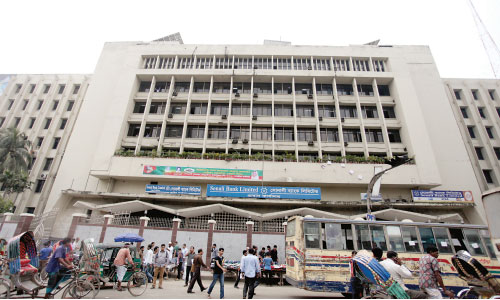The finance ministry in a frantic move to rescue the scandal-hit public sector banks has tilted to the World Bank for developing charters for bank boards, criteria of eligibility for becoming board members, and appointment regulations for potential bank directors.
The move to be carried out in the form of a WB project styled ‘Bangladesh modernization of state-owned financial institutions’ also includes rolling out corporate governance in all the nine commercial and specialised banks in the country and improving their nascent internal control and internal audit functions, a senior finance ministry official said.
Presently, more than 60 politically appointed directors are sitting on the boards of the nine state-owned banks, and it has been alleged that they often intervene in the banks’ operational aspects and influence their loan sanctioning process in favour of clients of their choice.
Khondkar Ibrahim Khaled, a former deputy governor of Bangladesh Bank, however, slammed the modernisation move at the insistence of the WB, saying no programme from the WB or any other agencies would bring any positive outcome in the state-owned banks, ‘until the government has a strong political commitment to cleanse the banks of political hoodlums, looters and corrupts.’
He called for empowering the BB to remove directors and chairmen of the SoBs and putting an end to appointing bank directors merely on political considerations.
Under the project, the WB will also focus on and assess the banks’ recapitalisation requirements and provide options on capital allocations, a finance ministry official said.
The areas to come under reform include weak and politically affiliated boards of directors, lack of formal criteria and procedures of appointing board members at the state banks, lack of corporate governance policies for the state banks, and nascent internal control and internal audit functions, finance ministry officials said.
According to the agreed minutes between the WB and the finance ministry, the project will address five key pillars of good corporate governance for the state-owned banks. These are –developing and redesigning the policies and legal frameworks for SoB governance, SoB ownership capacity of the finance ministry’s Bank and Financial Institutions Division, capacity of the SoB boards to govern the banks, transparency of the banks including the role of board audit committees and the quality of external audits, and internal control, internal audit, and compliance functions.
The key tasks under the pillars, according to the minutes, include establishing a clear legal framework for the banks and the overall framework, setting mandates for each bank, developing bank strategies, developing an ownership policy for the finance ministry’s Bank and Financial Institutions Division, developing and upgrading board charters, codes of conduct, and other key bank policies, setting clear criteria for board members, and establishing a transparent board appointment process, developing broad training programme in several topic areas, strengthening internal controls and key functions, and capacity building in finance and internal audit departments.
‘Our deal is final with the WB, as we now wait for their formal approval expected in June for rolling out the project to facelift the moribund state banks,’ a top finance ministry official said.
The project, to start from next fiscal year, will span five years, it was learnt.
Ibrahim Khalid said the government was responsible for appointing political leaders on the boards of public sector banks, and patronising corrupt top officials at those banks. ‘Three out of four managing directors at the state-owned commercial banks are thieves, who have managed to get job extensions several times,’ the former central banker said, adding that no initiatives from the finance ministry would yield any fruitful result in the banking sector, until the government determines to address the entrenched corruption and looting from its own banks.
Under the WB programme, all branches of the nine state banks across the country, numbering around 8,000, are set to be brought under the programme by installing IT infrastructure and protecting their cyber security.
A credit line of $140 million from the WB will finance the initiative, as the multilateral bank and the finance ministry early this month agreed the broad terms and conditions to shore up the struggling nine SoBs, another finance ministry official said.
The nine SoBs are Sonali, Janata, Agrani, Rupali, Bangladesh Development Bank Ltd, Bangladesh Krishi Bank, Rajshahi Krishi Unnayan Bank, Karmashangstahn Bank, and Ansar-VDP Bank. The banks have a combined capital shortfall of nearly Tk 1,100 crore as of March 31 this year, and the amount of their defaulted loans went above Tk 35,000 crore on December 31 last year, according to Bangladesh Bank data.
Officials concerned at the finance ministry said a good number of WB consultants will be involved under the project in streamlining the poorly managed public sector banks, and helping the banks turn around to a brighter image and better financial portfolios.
Source: New Age










